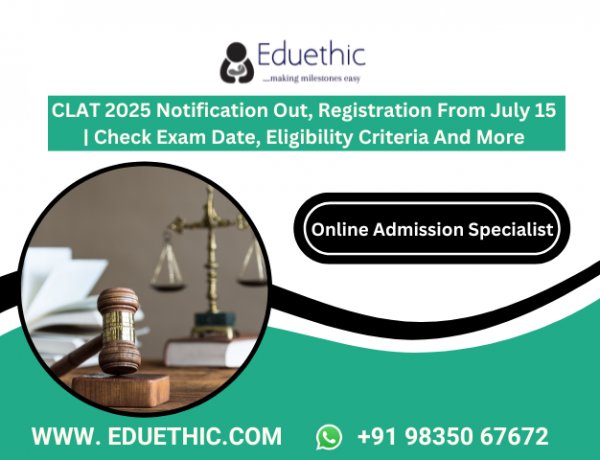CLAT 2025 Notification Out, Registration From July 15 | Check Exam Date, Eligibility Criteria And More
The application window for CLAT 2025, the entrance exam for top law schools in India, opens July 15th, 2024. The exam will be held on December 1st.

The Consortium of National Law Universities (NLUs) has issued a brief announcement regarding The Common Law Admission Test (CLAT) 2025. The application process for CLAT 2025 will begin on July 15th 2024. All interested candidates are able to apply online until October 15th 2024. The actual exam will be held on the 1st of December, 2024.
CLAT 2025 Notification: Important Dates* Registration Starts:
July 15, 2024
* Last Date to Apply: October 15, 2024
* Exam Date: December 1, 2024
CLAT 2025: Eligibility Criteria
Candidates are able to take a look at their CLAT 2025 eligibility criteria here.
The undergraduate programme is for students who have completed the Undergraduate Programme (five years combined law degrees)
Candidates must be able to pass an examination in the class of 12th or an equivalent exam with at the very least:
* 45% marks or equivalent for General Candidates
* 40 percent marks or an equivalent rating to Scheduled Caste (SC), Scheduled Tribe (ST), and Person with Disabilities (PwD) applicants.
Candidates taking the qualifying exam in April or March 2025 can also apply.
Post-graduate program (one one year LLM degree)
Candidates must possess at least an LLB degree or equivalent qualification, with at minimum:
* 50 marks or equivalent for general candidates
* 45 marks or equivalent mark to Scheduled Caste (SC), Scheduled Tribe (ST), and Person with Disabilities (PwD) applicants
Candidates taking the qualifying exam in May or April 2025 may also apply.
CLAT 2025: Application Fees
| Category | Application Fee | Application fee with question papers |
| General/OBC/EWS | Rs. 4,000/- | Rs 4,500 |
| SC/ST/PWD/BPL | Rs. 3,500/- | Rs 4,000 |
| Mode of Payment | Online | Online |
CLAT 2025 Exam Pattern
CLAT is a pen-and-paper based offline exam conducted for a duration of two hours (2:00 PM to 4:00 PM). The exam tests candidates' knowledge and skills in various legal and non-legal areas. The specific weightage for each section may vary slightly year-on-year, but generally, the exam pattern is as follows:
Legal Reasoning: This section assesses the candidate's comprehension of legal principles, their ability to analyze legal situations, and apply legal knowledge to solve problems.
Logical Reasoning: This section tests the candidate's analytical abilities, reasoning skills, and ability to identify patterns and arguments.
Quantitative Techniques: This section assesses the candidate's mathematical ability, data interpretation skills, and ability to analyze numerical data.
Current Affairs including General Knowledge: This section tests the candidate's awareness of current events, national and international issues, social, political, economic, and scientific developments.
Legal Aptitude: This section assesses the candidate's inherent understanding of legal concepts, legal terminology, and basic principles of jurisprudence.
English Language: This section tests the candidate's proficiency in English language, including grammar, vocabulary, comprehension, and writing skills.
The selection process for CLAT 2025 is multi-stage:
Stage 1: Written Exam: Candidates who qualify in the written exam will be shortlisted for the next stage.
Stage 2: Counselling: Shortlisted candidates will participate in a counselling process where they will be required to choose their preferred National Law Universities (NLUs) based on their rank and seat availability.
Stage 3: Document Verification: During counselling, candidates must provide original documents for verification to confirm their eligibility.
How to Apply for CLAT 2025
The application process for CLAT 2025 will be conducted entirely online on the official website of the Consortium of National Law Universities (consortiumofnlus.ac.in). Candidates are advised to carefully read the official notification and eligibility criteria before applying. The application form will require details such as academic qualifications, personal information, and choice of NLUs.




















